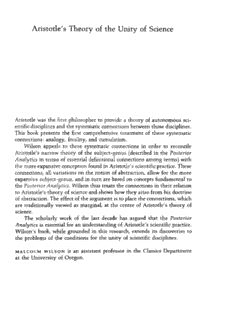Table Of ContentAristotle's Theory of the Unity of Science
Aristotle was the first philosopher to provide a theory of autonomous sci
entific disciplines and the systematic connections between those disciplines.
This book presents the first comprehensive treatment of these systematic
connections: analogy, focality, and cumulation.
Wilson appeals to these systematic connections in order to reconcile
Aristotle's narrow theory of the subject-genus (described in the Posterior
Analytics in terms of essential definitional connections among terms) with
the more expansive conception found in Aristotle's scientific practice. These
connections, all variations on the notion of abstraction, allow for the more
expansive subject-genus, and in turn are based on concepts fundamental to
the Posterior Analytics. Wilson thus treats the connections in their relation
to Aristotle's theory of science and shows how they arise from his doctrine
of abstraction. The effect of the argument is to place the connections, which
are traditionally viewed as marginal, at the centre of Aristotle's theory of
science.
The scholarly work of the last decade has argued that the Posterior
Analytics is essential for an understanding of Aristotle's scientific practice.
Wilson's book, while grounded in this research, extends its discoveries to
the problems of the conditions for the unity of scientific disciplines.
malcolm Wilson is an assistant professor in the Classics Department
at the University of Oregon.
PHOENIX
Journal of the Classical Association of Canada
Revue de la Societe canadienne des etudes classiques
Supplementary Volume xxxvm
Tome supplemental xxxvm
MALCOLM WILSON
Aristotle's Theory of
the Unity of Science
UNIVERSITY OF TORONTO PRESS
Toronto Buffalo London
© University of Toronto Press Incorporated 2000
Toronto Buffalo London
Printed in Canada
ISBN 0-8020-4796-3
©
Printed on acid-free paper
Canadian Cataloguing in Publication Data
Wilson, Malcolm Cameron
Aristotle's theory of the unity of science
(Phoenix. Supplementary volume ; 38 = Phoenix. Tome supplementaire,
ISSN 0079-1784 ; 38)
Includes bibliographical references and index.
ISBN 0-8020-4796-3
1. Aristotle - Contributions in methodology.
2. Aristotle - Contributions in ontology.
Science - Philosophy. I. Title.
II. Series: Phoenix. Supplementary volume (Toronto, Ont.); 38.
B485.W54 2000 185 C99-932973-1
University of Toronto Press acknowledges the financial assistance to its publishing
program of the Canada Council for the Arts and the Ontario Arts Council.
University of Toronto Press acknowledges the financial support for its publishing
activities of the Government of Canada through the Book Publishing
Industry Development Program (BPIDP).
CONTENTS
ACKNOWLEDGMENTS Vli
ABBREVIATIONS IX
INTRODUCTION 3
CHAPTER 1: GENUS, ABSTRACTION, AND
COMMENSURABILITY 14
Demarcating the Genus 15
Abstraction 29
1. Speed of Change 39
2. Value 41
3. Animal Locomotion 47
CHAPTER 2: ANALOGY IN ARISTOTLE'S BIOLOGY 53
Problems with Analogy 53
1. Fixity of Analogy 60
2. Difficult Cases 67
3. Analogues and the More and Less 69
4. Analogues and Position 69
5. Analogy of Function 72
6. Genus as Matter 74
A Solution 77
A Challenging Case 83
Analogy and Abstraction 86
vi Contents
CHAPTER 3: ANALOGY AND DEMONSTRATION 89
Analogy in APo: Passages and Discussion 91
Analogy in the Biology 99
Analogy and the Scala Naturae 109
CHAPTER 4: THE STRUCTURE OF FOCALITY 116
Focality and Per Se Predication 122
The Limits of Focality in the Biological Works 129
CHAPTER 5: METAPHYSICAL FOCALITY 134
The Genus of Being 136
Categorial Focality in Metaphysics Z 144
Demonstration in the Science of Being 158
The Wider Focal Science of Being 165
CHAPTER 6: MIXED USES OF ANALOGY AND FOCALITY 175
Matter and Potentiality 177
The Good 194
CHAPTER 7: CUMULATION 207
Souls 208
1. The Analogical Account 210
2. The Cumulative Account 214
Friendship 224
1. Eudemian Ethics and the Problems of Focal Friendship 225
2. The Nicomachean Version 231
The Place of Theology in the Science of Being 235
Conclusion: Analogy, Focality, and Cumulation 239
BIBLIOGRAPHY 243
INDEX LOCORUM 255
GENERAL INDEX 265
ACKNOWLEDGMENTS
My first thanks go to my teachers at Berkeley, Tony Long, John Ferrari, and Alan
Code, who supervised the dissertation from which this book arose. Mary Louise Gill
and James Lennox also kindly read my entire dissertation and provided encourage
ment and advice. Friends and colleagues have read and commented on various parts
in various stages of completion: Andrew Coles, William Keith, John Nicols, Scott
Pratt; and my wife, Mary Jaeger, who conquered 'philosophy-induced narcolepsy'
to read the entire manuscript more than once. Two anonymous reviewers for the
University of Toronto Press provided much detailed and general comment useful in
improvement. Finally, I should also like to thank Ancient Philosophy for permission
to use material published in 'Analogy in Aristotle's Biology,' Ancient Philosophy
17 (1997).
ABBREVIATIONS
Works of Aristotle
APo Posterior Analytics
APr Prior Analytics
Cat. Categories
DA de Anima
DC de Caelo
Dl de Interpretatione
EE Eudemian Ethics
EN Nicomachean Ethics
GA Generation of Animals
GC Generation and Corruption
HA History of Animals
1A Progression of Animals
)uv. On Youth, Old Age, Life and Death
Long. On Length and Shortness of Life
MA Movement of Animals
Met. Metaphysics
Mete. Meteorologica
MM Magna Moralia
PA Parts of Animals
Phys. Physics
PN Parva Naturalia
Pol. Politics
Resp. Respiration
S E Sophistical Refutations
Sens. Sense and Sensibilia
Somn. de Somno
Top. Topics
x Abbreviations
Other Works
LSJ H.G. Liddell and R. Scott. A Greek-English Lexicon. Revised and
augmented by H. Jones. Oxford: Clarendon Press, 1996.
ROT J. Barnes. The Complete Works of Aristotle. The Revised Oxford
Translation (Bollingen Series LXXI.2). Princeton: Princeton University
Press, 1984.
Acronyms and Summary of Per Se Relations
IPO is predicated of
SGA species-genus-analogy
WP wholes-parts
per se (1) predicate: is contained in the definition of its subject, e.g., linear
is predicated of triangle.
per se (2) predicate: contains its subject in its definition, e.g., female is
predicated of animal.
per se (3) is self-subsistent subject, e.g., man.
per se (4) predicate: is predicated of something on account of itself, e.g.,
dying is predicated of being slaughtered.
Description:This book presents the first comprehensive treatment of Aristotle's theory of autonomous scientificdisciplines and the systematic connections between them: analogy, focality, and cumulation.

